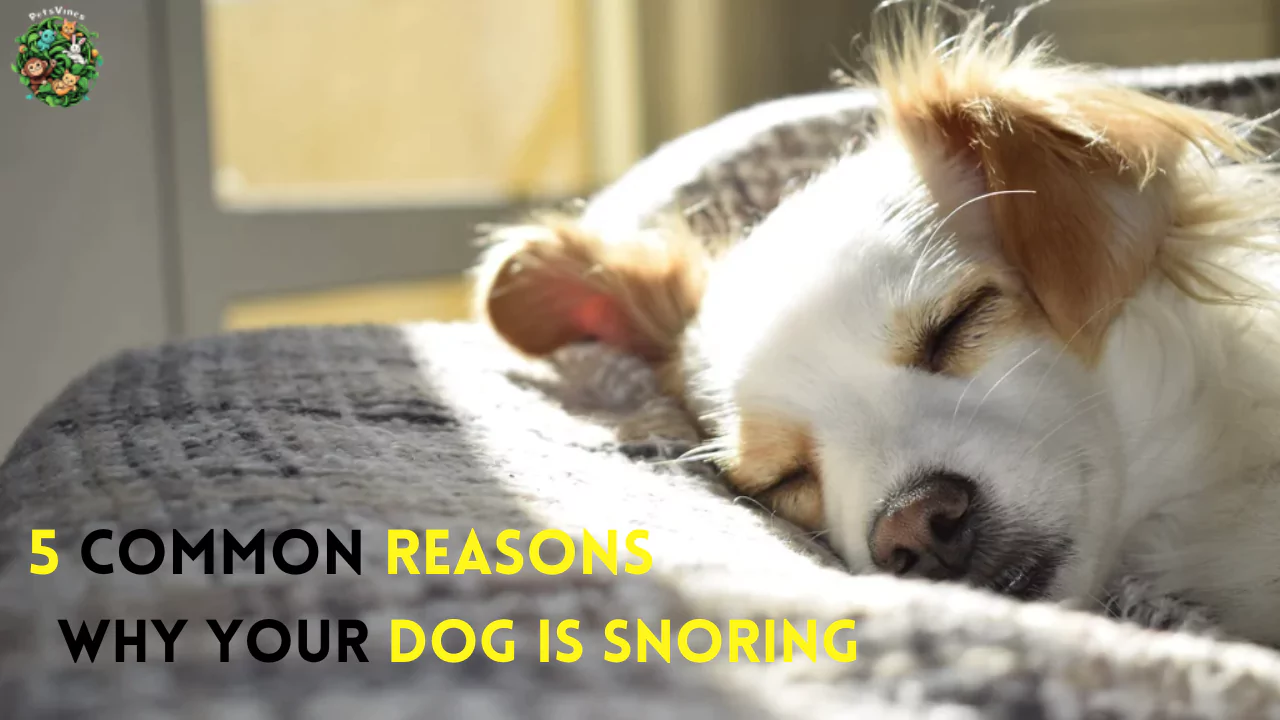Snuggling up to your dog can be the highlight of your day, but what happens when your furry friend turns into a mini chainsaw with their snoring? While dog snoring can be adorable at first, it might leave you wondering, “Why is my dog snoring so much?”
This article dives into five common reasons why your dog might be snoring and how to address them. We’ll keep it simple, fun, and packed with valuable tips. Let’s uncover the mystery behind your dog’s snore symphony!
1. Your Dog’s Sleeping Position
Dogs, just like humans, can snore due to their sleeping posture. When your dog sleeps on its back, the tongue and soft palate relax, partially obstructing airflow and causing snoring.
How to Spot It:
- Your dog prefers sleeping belly-up.
- Snoring stops or reduces when your dog changes position.
What You Can Do:
- Encourage side sleeping by providing a cozy donut-shaped bed. These beds promote curled-up sleeping, which can reduce snoring.
- Try adjusting your dog’s sleeping area to minimize distractions, making them less likely to roll onto their back.
2. Breed-Specific Traits
Certain breeds are more prone to snoring due to their anatomy. Brachycephalic breeds—dogs with flat faces and short noses—are frequent snorers. These breeds include:
- Bulldogs
- Pugs
- Boston Terriers
- Shih Tzus
Why This Happens:
Their compact facial structure can lead to narrowed nostrils and elongated soft palates, making it harder for air to flow freely.
Expert Insight:
According to Dr. Karen Becker, a renowned veterinarian, “Brachycephalic breeds often suffer from Brachycephalic Obstructive Airway Syndrome (BOAS), which can cause snoring and other breathing issues.”
What You Can Do:
- Keep your dog at a healthy weight to reduce pressure on their airway.
- Use a harness instead of a collar to avoid throat compression.
- Schedule regular vet checkups to monitor breathing health.
3. Obesity and Weight Issues
An overweight dog is more likely to snore. Excess fat can accumulate around the throat, restricting airflow and causing snoring.
Signs to Look For:
- Your dog snores loudly and consistently.
- Other signs of obesity, such as difficulty moving or visible weight gain.
Quick Stats:
A study by the Association for Pet Obesity Prevention (APOP) found that 55.8% of dogs in the U.S. are overweight or obese (source).
How to Address It:
- Diet Adjustments: Switch to a vet-recommended low-calorie diet.
- Exercise Routine: Regular walks and playtime help shed those extra pounds.
- Portion Control: Use a measuring cup to ensure accurate feeding.
4. Allergies or Irritants
Dogs are sensitive to environmental allergens just like humans. Allergens can irritate the nasal passages, leading to snoring.
Common Allergens Include:
- Dust mites
- Pollen
- Smoke
- Household cleaning products
Symptoms Alongside Snoring:
- Sneezing or coughing
- Watery eyes
- Itchy skin
Expert Tip:
Dr. Jennifer Coates, a veterinary advisor, explains, “Seasonal allergies or irritants can cause inflammation in a dog’s airways, making it harder for them to breathe smoothly.”
Solutions:
- Vacuum frequently and wash your dog’s bedding weekly to reduce dust and allergens.
- Use HEPA air purifiers to improve air quality.
- Consult your vet for antihistamines or allergy treatments if symptoms persist.
5. Health Issues and Obstructions
Snoring can sometimes signal an underlying health problem, such as:
- Nasal Obstructions: Foreign objects or nasal tumors can block airflow.
- Respiratory Infections: Conditions like kennel cough or sinusitis can cause snoring.
- Sleep Apnea: Rare but possible, this can lead to interrupted breathing during sleep.
Warning Signs:
- Snoring has recently worsened or started abruptly.
- Your dog struggles to breathe even when awake.
- Signs of distress, such as gagging or choking.
What to Do:
- Visit the Vet: Early diagnosis is key for effective treatment.
- Monitor Symptoms: Keep a log of snoring patterns and related behaviors.
- Post-Surgery Care: In severe cases, surgery might be necessary to address obstructions or structural issues.
Preventative Tips for a Snore-Free Pup
While some snoring is natural, here are general tips to reduce it:
- Maintain a Healthy Weight: Proper nutrition and exercise prevent obesity, a leading cause of snoring.
- Regular Grooming: Especially for breeds prone to allergies, clean ears and trim fur around the nose.
- Clean Sleeping Areas: Keep your dog’s bed clean and free from irritants.
- Proper Hydration: Dehydration can thicken mucus, contributing to snoring.
When to See a Vet
Snoring that’s persistent, loud, or accompanied by other symptoms warrants a visit to the vet. Early intervention can prevent minor issues from escalating into major problems.
Wrapping It Up
Snoring in dogs might be cute, but it’s important to understand its root cause. Whether it’s their sleeping position, breed-specific traits, or a sign of a health issue, there’s always something you can do to help. By taking simple steps and paying attention to your dog’s overall health, you’ll both enjoy quieter and more restful nights.











